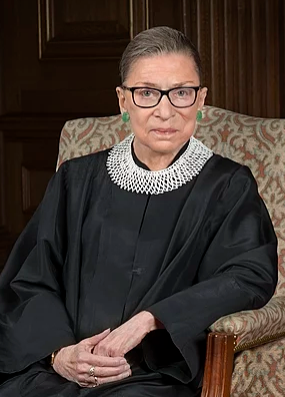
- Details
- By Native News Online Staff
WASHINGTON — United States Supreme Court Justice Ruth Bader Ginsburg has died.
Having been nominated by President Bill Clinton, Justice Ginsburg served on the nation’s highest court since Aug. 10, 1993. The Supreme Court announced on Friday evening that Justice Ginsburg died of pancreatic cancer. She was 87.
Ginsburg opinions on American Indian claims were mixed.
"Justice Ginsburg ruled in favor of the tribes most of the time and we are going to miss her," John E. Echohawk (Pawnee), executive director and founder of the Native American Relief Fund said Friday evening.
Navajo Nation President Jonathan Nez said Justice Ginsburg leaves behind a great legacy of fighting for the rights of all people and upholding the rule of law.
"She was a true champion of justice. Her love and compassion for all people will always be cherished and remembered. Our country is stronger because of her many years of contributions to the U.S. Supreme Court and to Indian Country. We offer our thoughts and prayers for all of her family members, friends, and colleagues,” President Nez said.
U.S. Sen. Tom Udall (D-N.M.), vice chairman of the Senate Committee on Indian Affairs, commented in an email on Friday evening as well.
“Jill and I join the nation in mourning this devastating loss. Justice Ginsburg was a friend to us – and an icon of righteousness for the nation. She inspired us all, but her legacy shines especially bright for the countless women and girls across the nation and world who now proudly walk in her footsteps. Justice Ginsburg fought for fairness above all—for a nation that lives true to its principles—and she brought us ever closer to that ideal," Udall said.
In a historic U.S. Supreme Court decision on July 9 in McGirt v. Oklahoma, which ruled in favor of the Muscogee (Creek) Nation, Justice Ginsburg voted with the majority.
In May 2020, The Buffalo Chronicle reported that Justice Ginsburg told close legal colleagues and clerks that she wants President Donald Trump “to select a Native American jurist as his next nominee to the United States Supreme Court."
More Stories Like This
Native News Weekly (August 25, 2024): D.C. BriefsNative Bidaské: The Illusion of Freedom and the Myth of America 250, Leonard Peltier Speaks Out
Monday Morning (March 2, 2026): Articles You May Have Missed This Past Weekend
Native News Weekly (March 1, 2026): D.C. Briefs
Scope Narrowed, Report Withheld: Questions Mount Over Michigan Boarding School Study
Help us defend tribal sovereignty.
At Native News Online, our mission is rooted in telling the stories that strengthen sovereignty and uplift Indigenous voices — not just at year’s end, but every single day.
Because of your generosity last year, we were able to keep our reporters on the ground in tribal communities, at national gatherings and in the halls of Congress — covering the issues that matter most to Indian Country: sovereignty, culture, education, health and economic opportunity.
That support sustained us through a tough year in 2025. Now, as we look to the year ahead, we need your help right now to ensure warrior journalism remains strong — reporting that defends tribal sovereignty, amplifies Native truth, and holds power accountable.
 The stakes couldn't be higher. Your support keeps Native voices heard, Native stories told and Native sovereignty defended.
The stakes couldn't be higher. Your support keeps Native voices heard, Native stories told and Native sovereignty defended.
Stand with Warrior Journalism today.
Levi Rickert (Potawatomi), Editor & Publisher

